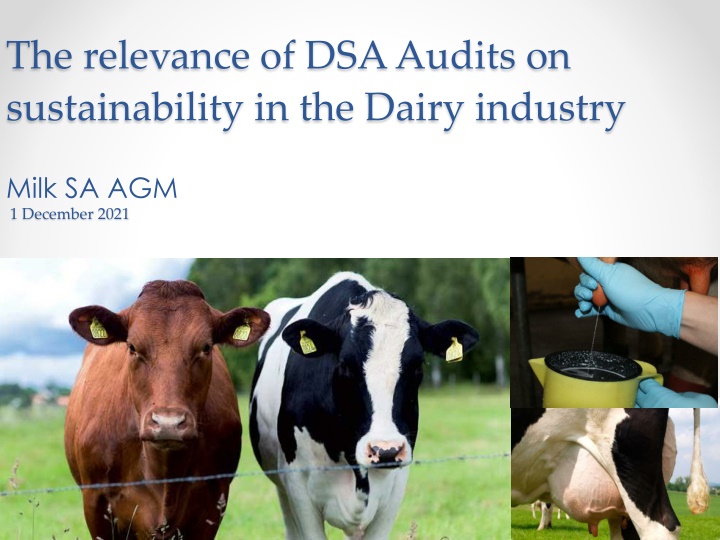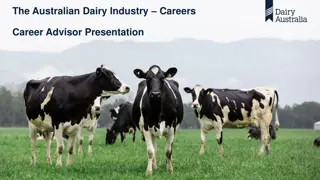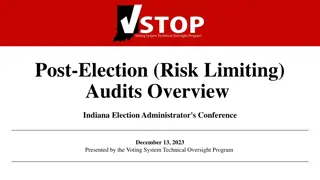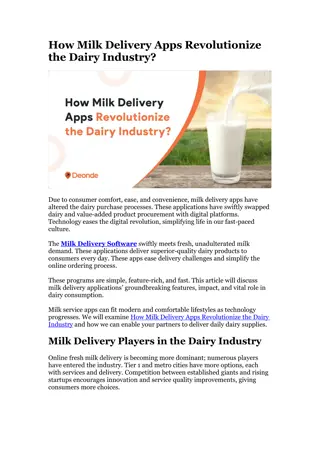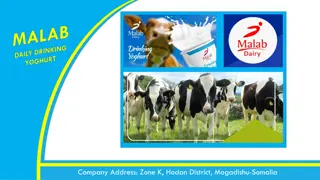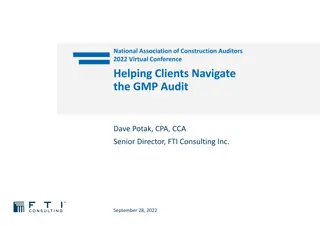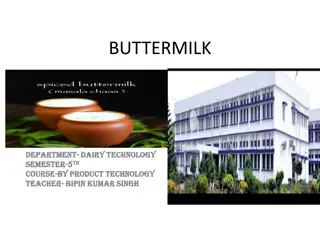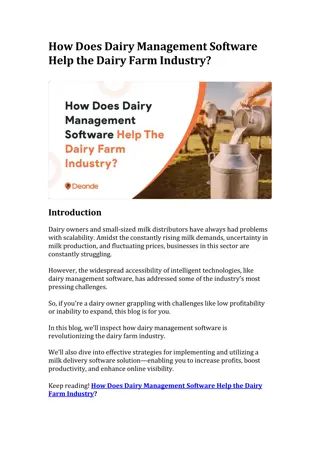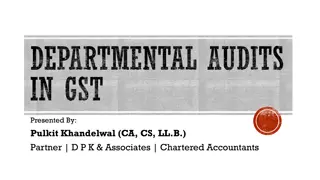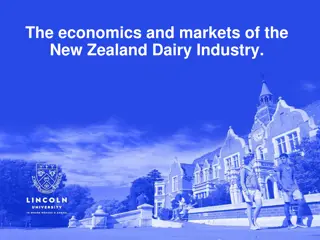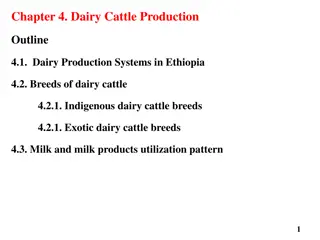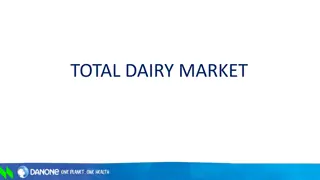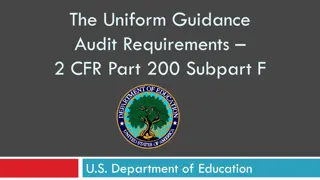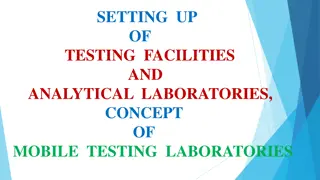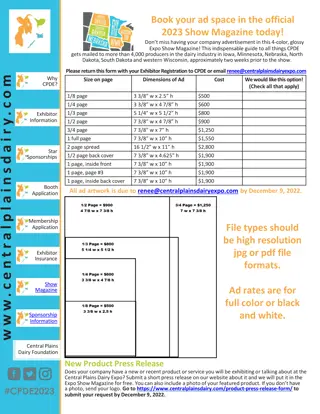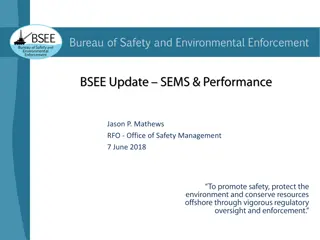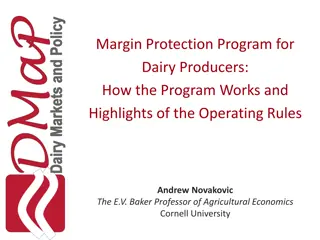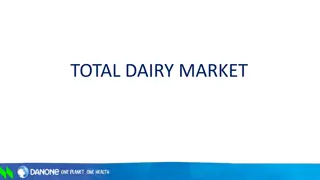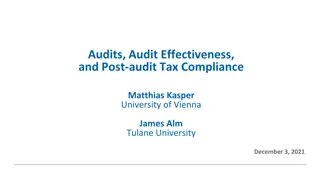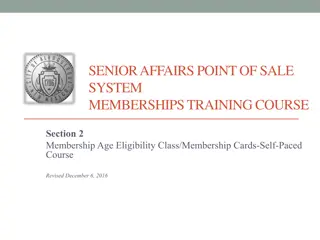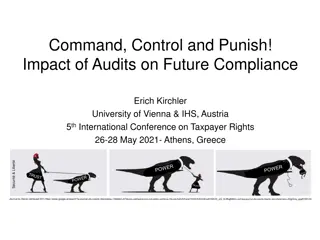The relevance of DSA Audits on sustainability in the Dairy industry
In the dairy industry, the relevance of DSA audits on sustainability plays a crucial role in addressing systemic risks related to animal welfare, environmental incidents, and integrity. Stakeholders have a moral and legal obligation to mitigate these risks by understanding the interconnected elements influencing sustainability. Pressure from global dairy organizations, fear of media scrutiny, and a drive to go beyond legal requirements are key drivers of sustainability initiatives. The focus is on ethical conduct, risk mitigation, technology utilization, and facilitating commerce.
Download Presentation

Please find below an Image/Link to download the presentation.
The content on the website is provided AS IS for your information and personal use only. It may not be sold, licensed, or shared on other websites without obtaining consent from the author.If you encounter any issues during the download, it is possible that the publisher has removed the file from their server.
You are allowed to download the files provided on this website for personal or commercial use, subject to the condition that they are used lawfully. All files are the property of their respective owners.
The content on the website is provided AS IS for your information and personal use only. It may not be sold, licensed, or shared on other websites without obtaining consent from the author.
E N D
Presentation Transcript
The relevance of DSA Audits on sustainability in the Dairy industry Milk SA AGM 1 December 2021
Dairy industry and sustainability It is not an overstatement that in the different disciplines of the dairy value chain: the importance of sustainability is not always fully understood often a lack of understanding that sustainability is linked to a list of interactive elements influenced by issues such as the economy, the environment, animal welfare and social well being Sustainability measures are not always risk based with a tendency to be rather reactive at a cost than proactive
Why should we be so concerned An major event relating to poor animal welfare or an environmental incident (poor waste management) have the potential to trigger systemic risks and draws the attention of: public health at large via the media Impact the stability of the entire dairy industry as role-player in the agro processing sector Have a negative effect on the integrity of dairy as a whole Stakeholders have a moral and legal obligation to mitigate systemic risk caused by interdependencies and among participants
SA Dairy Supply Chain Primary industry - 1548 producers and 3723 milking sheds. Secondary industry 140 dairy processors including pd s 6 large retail companies
What drives sustainability initiatives in the SA dairy value chain o pressure from the global dairy sector linked to FAO, IDF, Dairy Sustainable Framework and our retail industry to conform to higher level of standards o fear of media, litigation and law enforcement o marketing ploys o corporate governance What is really needed
A continuous drive to go beyond by what is required by national law. Ethics and a code of conduct a sense of moral correctness within society that: satisfy the needs of the consumer satisfy legal compliance and mitigate risks gain maximum benefit from available technology and risk based management systems make national and international commerce easier to conduct
Dairy Sustainable Framework The Dairy Sustainability Framework is the Global Dairy Agenda for Action (GDAA) program for aligning and connecting sustainability initiatives to demonstrate leadership and progress globally. committed to make a positive contribution to reducing greenhouse gas emissions (GHG) in the global dairy sector. commitment also involved the development of tools that supported emission reduction strategies in a way that was environmentally sound, economically viable and socially responsible.
International Dairy Federation IDF work grouped into ten areas. - Animal Health and Welfare - Dairy science and technology - Economics and policies - Environment - Farm management - Food standards - Hygiene and safety - Marketing - Methods of analysis and sampling - Nutrition and health
SA fundamental sustainability commitments include ensuring best care for all our animals; reducing our environmental impact; providing nutritious and safe products; and creating a rewarding livelihood for those that work in the industry.
Regulatory environment - Foodstuffs, Cosmetics and Disinfectants Act, 1972 (Act 54 of 1972); - Agricultural Product Standards Act, 1990 (Act 119 of 1990); - Animal Diseases Act, 1984 (Act 35 of 1984); - Fertilisers, Farm Feeds, Agricultural Remedies and Stock Remedies Act, 1947 (Act 36 of 1947); - National Environmental Management Act 107 of 1998 - Animal Protection Act of 1962
Regulatory environment SANS 1694 The welfare of dairy cattle/IDF Bulletin of the IDF N 498/2019: The IDF Guide to Good Animal Welfare in Dairy Production ISO 22000 Prerequisite programmes on food safety Part 3: Farming SANS 898: Good manufacturing practices for the self mixing of feed in the livestock industry SANS 10049: Food safety management Requirements for prerequisite programmes (PRPs) FAO Guide to good dairy farming practice DSA Code of Practice for Milk Producers
DSA Audits DSA Farm Regulatory Audit (R961) per unit DSA Farm GAP Milking Shed Audit per unit Animal Welfare Audit per unit (Regulatory + Welfare) Combination Audit of the DSA Farm GAP Audit and Animal Welfare Audit per unit
DSA audit criteria 1. Regulatory environment 2. Environmental management 3. Milking shed 4. Udder health udder preparation and gmp 5. Maintenance of facilities and equipment 6. Bulk milk storage 7. Collection and transport of milk 8. General hygiene and control over chemicals 9. Personnel hygiene 10. Technical training
DSA audit criteria 11. Herd health an animal welfare 12. Animal feeding 13. Animal housing 14. Dairy management, contingence planning and control measures 14. Biosecurity 15. Documentation control
SANS 1694: The Welfare of Dairy Cattle Milk SA funded project purpose: Application of the DSA animal welfare audit on a number of farms, identify issues and confirm areas of amendment of the SANS 1694 standard as well as DSA audit format and criteria. Process subject to proposals to Milk SA R&D, industry comments and final submission of proposal/report to SABS Standards writer.
SANS 1694: The Welfare of Dairy Cattle 5 4 3 2 1 0 5 4 3 2 1 1 LIKELIHOOD / WAARSKYNLIKHEID 10 8 6 4 2 2 15 12 9 6 3 3 20 16 12 8 4 4 25 20 15 10 5 5 I M P A C T RISK INDEX 20-25 10-19 5-9 1-4 NON CONFORMANCE X x x x AF CRITICAL/KRITIES MAJOR/ERNSTIG MINOR/GERING
DSA Code of Practice for milk Producers Latest publication refers to sustainability Environmental management Herd health Animal Welfare incl SANS 1694
